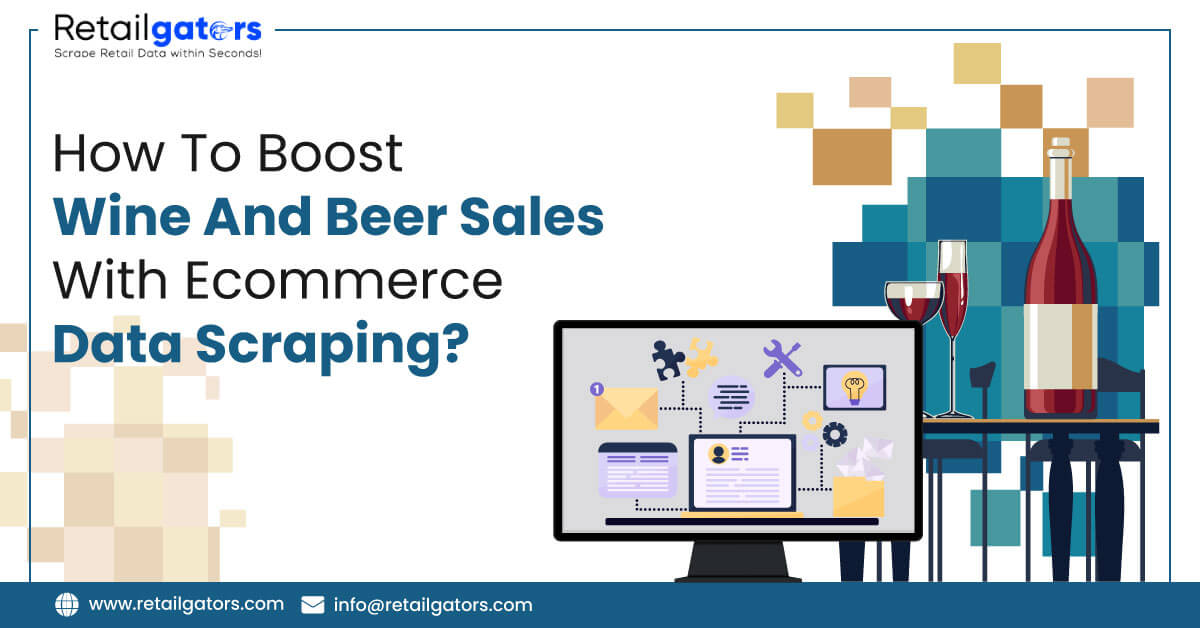
Did you know that the alcoholic beverages market will be growing around 37% by 2028? Multiple ecommerce websites let customers make a successful purchase of wine and beer from the comfort of their personal space. Liquor data scraping will help you explore the wine and beer market in-depth and optimize per market demand.
Be it customer reviews, pricing, availability, ratings, or more, you can gather information according to your requirements to meet customer expectations. It helps businesses to develop pricing strategies and market trends, identify demands, and analyze customer interests.
Why Ecommerce Data Scraping For Wine And Beer Sales?
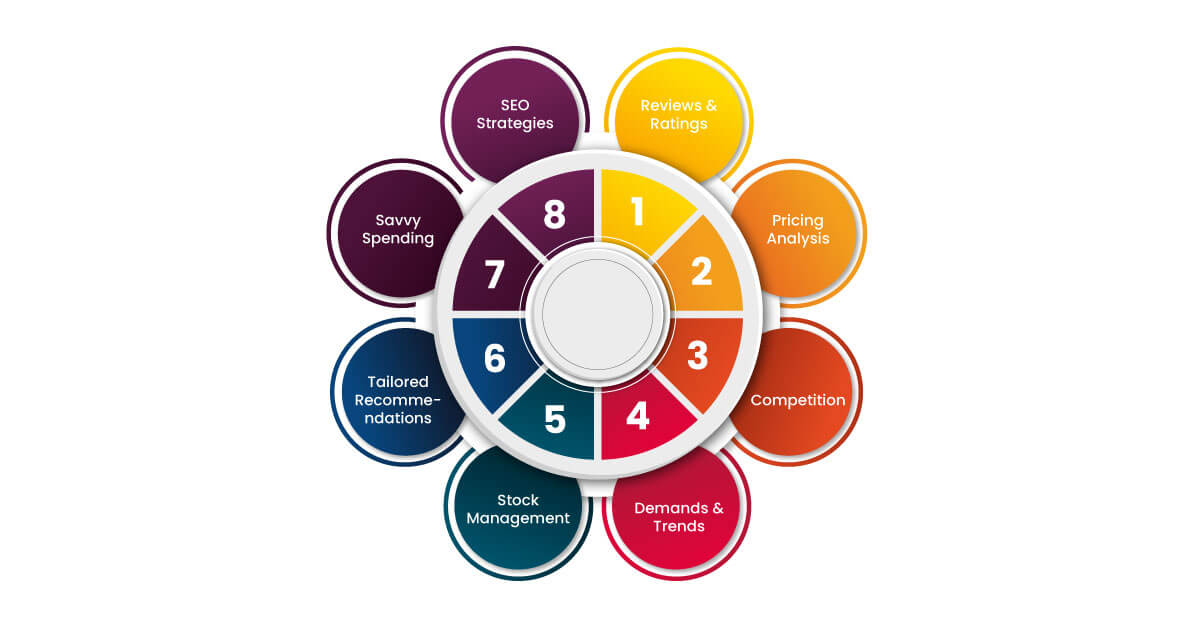
Empower your business with the control that data scraping provides. Understand the challenges and stay updated in the market to avoid potential losses. Creating an automated process to collect data through ethical procedures makes it easier to analyze and predict future outcomes.
Here are some of the strategic reasons to explore data in wine and beer businesses:
Reviews and Ratings
Accessing customer reviews and ratings helps to understand customers’ likes and dislikes. Use this data to optimize the business and deliver a strong support and personalized experience on your platform, showing your customers that you care about their opinions.
Pricing Analysis
Wine and beer sellers offer discounts and deals that quickly attract customers' interest. Scraping pricing information helps you focus on your strategies based on brand, quantity, combo, size, seasonal demands, etc.
Competition
Understand your competitor's techniques to gain customers and make favorable choices for your potential leads. This helps understand the market gaps and offer better solutions to the customers.
Demands and Trends
Understanding customer interests and market trends is essential to generate better revenue. Analyze the wine style, taste preferences, popular beers, and other factors that gain customers’ attention.
Stock Management
Understanding the alcohol data set helps determine the availability of wine, beer, and liquor products. This ensures that the stock is accurate and meets customer demands.
Tailored Recommendations
You can start understanding customer preferences to curate personalized suggestions that enhance their experience and boost your chance of generating leads.
Savvy Spending
You can easily compare your competitors to reveal budget-friendly options for the customers. Then, start updating the stock to make huge returns with minimal investments.
SEO Strategies
Figure out the top-ranking keywords, detailed product descriptions, phrases, images, and other factors that are making an impact on consumers. Optimize, track, and evaluate your strategies to meet the demands with ideal marketing campaigns.
What Are The Data Fields Extracted During Alcohol Data Scraping?
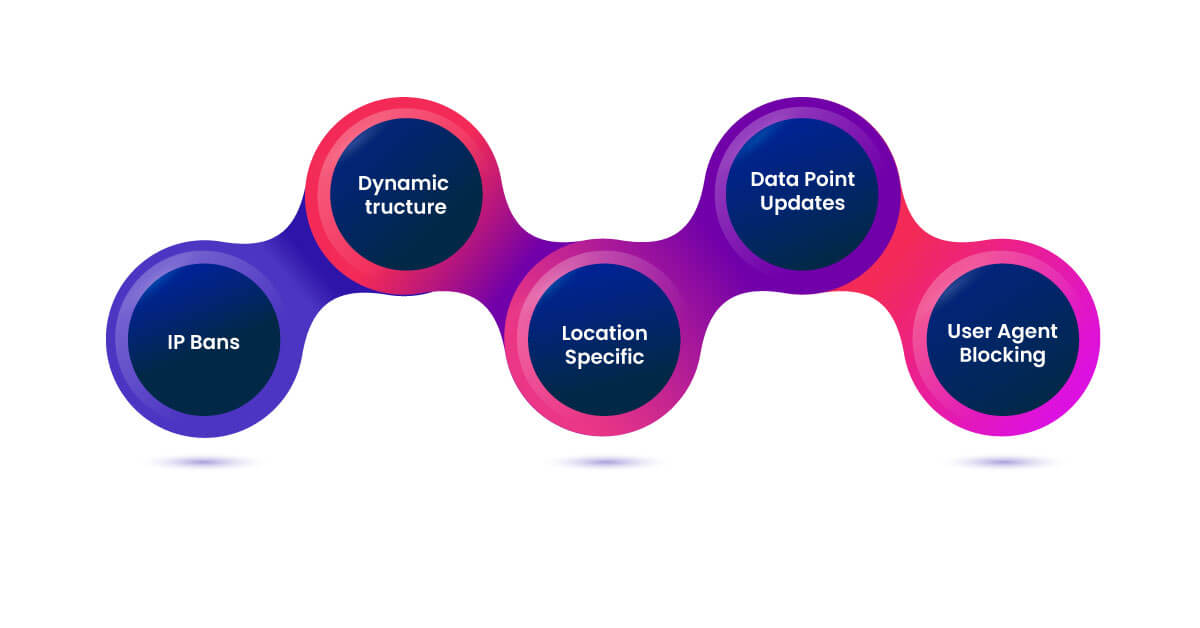
Understanding the data fields that are gathered during ecommerce data scraping for wine and beer details is vital. Here are some of the standard data fields extracted
- Store Name
- Product Description
- Product Features
- Address
- Product Names
- Product Multimedia
- Product Category
- Product SKU
- Prices
- Offers and Deals
- Service Available
- Reviews and Ratings
- Region
- Varieties
- Taste
How To Scrape Liquor Data Using Python?
Follow the simple process that can be optimized as per your requirements to extract data from wine and beer ecommerce sites
Install Required Packages
Start by installing Python 2, then install these two libraries:
- Python Requests
- Selectorlib
Once done, open your terminal or command prompt to run the commands.
Start Coding
Create a file name products.py and add the following code:
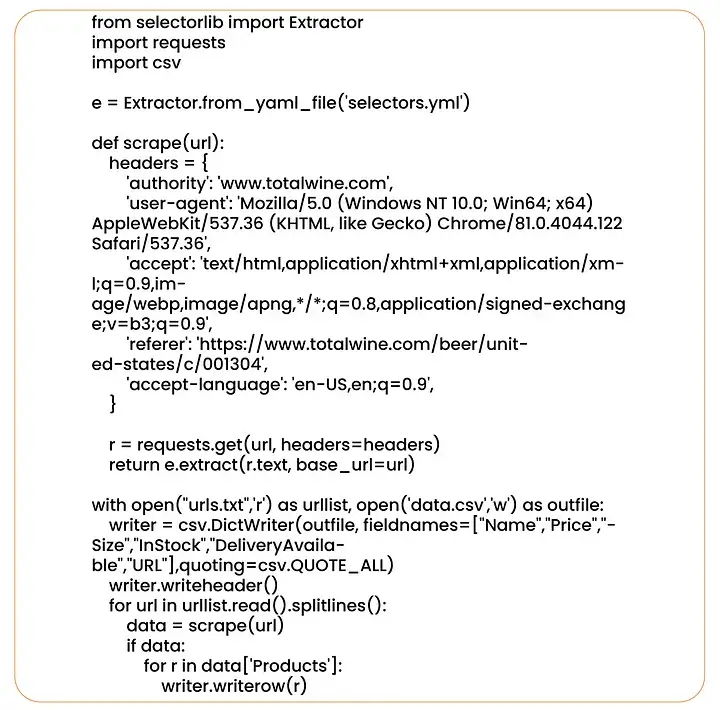
It will read a list of URLs through a file named "urls.txt," where you can add the target product pages. Use the Selectorlib YAML file to define the data elements you want to scrape from the target platform.
Build YAML File "selectors.Yml"
Selectorlib is a robust tool that helps to simplify the process of choosing and extracting alcohol data sets from the web page. Follow this process to create the file:
- Install the Selectorlib Chrome extension and redirect it to the target web page where you will gather data.
- Use tools to select and mark the data fields you want to extract.
- Now, click on the "Highlight" button to get a preview and ensure you have the correct data.
- Once you verify, hit the "Export" button and download the selectors.yml file.
Here is how the template file must look:
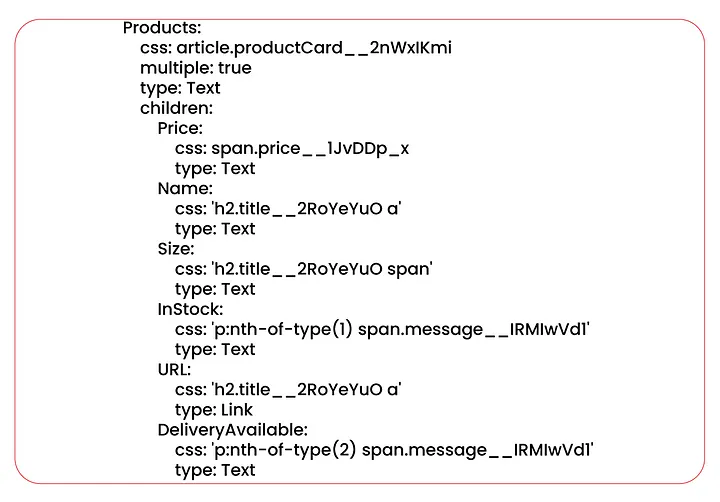
Specify the URLs in each new line you want to scrape in the "urls.txt" file stored in the directory where you have the Python script.
How To Ethically Handle Alcohol Data Scraping?
Many websites and apps have intelligent strategies to block illegal data extraction processes and misuse of information. Gathering information through the right tools, such as those that respect robots.txt files and use dynamic proxies, is essential. Respecting the website policies is also crucial. Here are some tips you should consider during liquor data scraping:
Robots.txt
This file will define the available data for extraction and which segments are off-limits because they might contain sensitive data.
Dynamic Proxies
Many tools use rotating proxies to avoid IP blocks and detection during the data scraping.
Tracking
It is essential to monitor the complete process to handle errors instantly and ensure an accurate data extraction process.
Request Limitation
Avoid too many requests at small intervals, as overloading affects the website performance, increasing detection chances. So, ensure you have dynamic intervals to send requests, which means varying the time between requests to mimic human behavior and avoid detection.
Data Parsing
Invest in scraping tools capable of accurately extracting wine and beer data, even with dynamic website structure and other techniques to detect robots.
Who Benefits From Liquor Data Scraping?
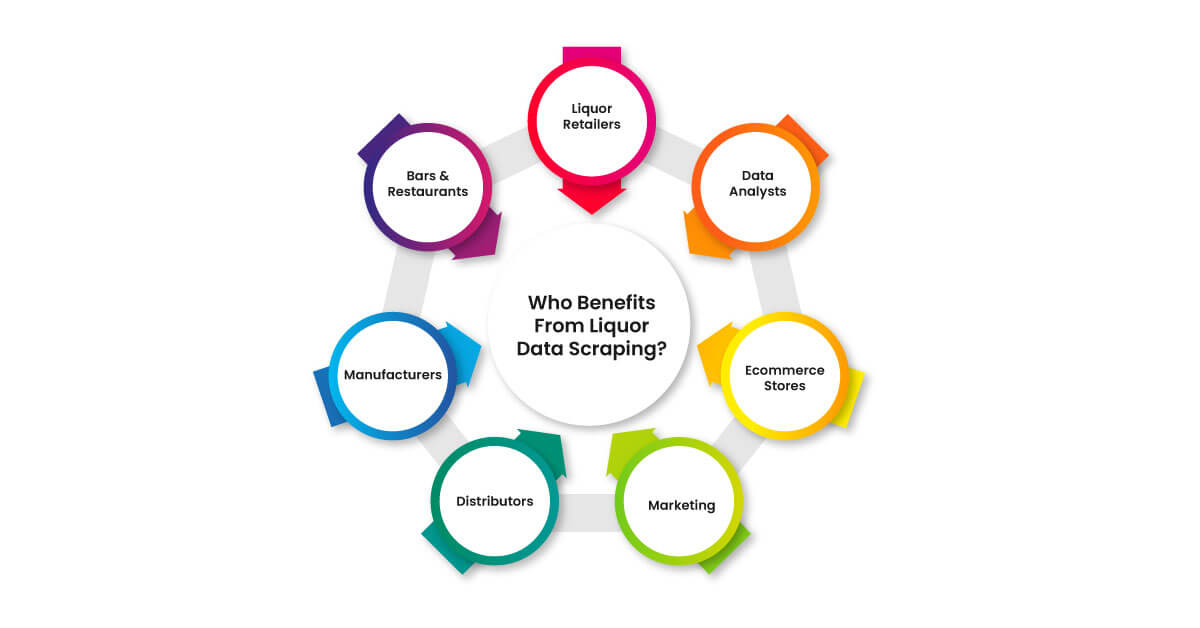
Diverse businesses are dealing in the liquor industry, be it wine, beer, beverages, or anything else affected by market dynamics. Here are the top ones that indulge with this market closely:
Liquor Retailers
Scraping wine and beer data will help them maintain the correct stock levels, innovative pricing strategies, and personalized customer services.
Data Analysts
Some firms analyze their performance after specific intervals to understand their growth, profits, and losses. Data analysts will look into the liquor data set to take action and empower the business toward a profitable margin.
Ecommerce Stores
Online liquor retailers can focus on optimizing their listings, delivering custom solutions, and ensuring seamless customer experience on their platform.
Marketing
When planning to sell liquor, wine, or beer online, it is important to focus on marketing strategies to reach potential audiences faster and more cost-effectively. The alcohol data set will help create engaging advertisements that connect with consumers and boost sales.
Distributors
By scraping liquor data, they can understand the fastest route, profit margin, and expenses in depth. It allows them to streamline their supply chains and ensure profitable distribution for their business.
Manufacturers
Expanding their wine and beer business becomes effortless when they have all the data to understand the popular products, tastes, and customer preferences. They can focus on elevating quality, size, taste, and other factors consumers prefer.
Bars and Restaurants
Exploring the competitor's strategy, they get an edge in the market to create enticing menus with unique drinks and deliver memorable customer experiences.
What Are The Common Challenges In Alcohol Data Scraping?
There are many pitfalls while scraping liquor data, which can affect the complete data extraction process. It is essential to stay updated and maintain the functionalities of the tools you use to extract precise data from the target platforms. Let us look at some common issues that might occur during the data scraping process:
IP Bans
Websites are becoming more cautious of illegal activities on their platform. If you have a strong proxy provider, you can ultimately be allowed access to the website.
Dynamic Structure
The website may have CAPTCHAs or require a click-action to access the data set completely. Many tools must be updated or made more effective in such a scenario, leading to limited data extraction and inaccurate data sets.
Location Specific
Target websites might need additional methods to choose the location beyond relying on just "local" stores. Choosing the scraping tools that handle this complexity and deliver location-specific data is essential.
Data Point Updates
Web pages might update or add new data points, affecting the coding script's ability to gather information. Ensure your tool is regularly updated per market changes to extract accurate information hassle-free.
User Agent Blocking
Websites may block specific users to prevent automated scraping of sensitive information. To handle such complications, rotating proxies and updated tools are essential.
Why Invest In Retailgators?
We have shared insights about wine and beer data scraping, highlighting the importance of making data-driven decisions to grow successfully in the market. With professional support, gathering valuable information from competitors and customers to analyze becomes easier.
Before you decide, you must access the market and find the proper support that offers custom solutions to meet your demands. At Retailgators, we ensure that businesses are transformed through data scraping solutions. Our experts have handled small, medium, and large-scale companies, exposing them to the market to deliver the right scraping solution. We aim to extract information that will help businesses to optimize their strategies and target potential customers smartly.
Liquor data scraping will provide you with great opportunities in the market, like offering the right deals, picking the right brands, and delivering through the fastest routes to the customers.








Leave a Reply
Your email address will not be published. Required fields are marked